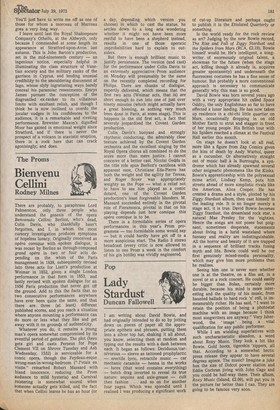The Proms
Bienvenu Cellini
Rodney Milnes
There are probably, to paraphrase Lord Palmerston, only three people who understand the genesis of the opera Benvenuto Cellini: Berlioz, who's dead, Colin Davis, who thankfully hasn't forgotten, and I, in whom the most cursory investigation produces symptoms of hopeless lunacy. Originally conceived as opera comique with 'spoken dialogue, it was recast by Berlioz as through-composed grand opera in two or four acts depending on the whim of the Paris management in 1838, subsequently revised into three acts for Liszt's production at Weimar in 1852, given a single London performance in that form in 1853, and lastly revised with spoken dialogue for an 1856 Paris production that never got off the ground. Add to this the facts that no two consecutive performances anywhere have ever been quite the same, and that there are three (at least) different published scores, and you reach a situation where anyone mounting a performance can do more or less what they like and get away with it on grounds of authenticity.
Whatever you do, it remains a young man's opera somewhat compromised by its eventful period of gestation. The plot (hero gets girl and casts Perseus for Pope Clement VII on Shrove Tuesday and Ash Wednesday, 1532) is serviceable for a comic opera, though the Feydeau-esque wrong-man-in-wrong-bedroom (" J'etais en visite." remarked Robert Massard with bland innocence, reducing the Prom audience to mild hysteria) and Carnival roistering is somewhat soured when someone actually gets killed, and the fact that when Cellini learns he has an hour (or a day, depending which version you choose) in which to cast the statue, he settles down to a long aria wondering whether it might not have been more restful to have been a shepherd instead, results in one of those operatic improbabilities hard to explain to outsiders.
But there is enough brilliant music to justify persistence. The version (and cast) for the performance under Colin Davis to an extremely appreciative Prom audience on Monday will presumably be the same on the recently completed recording for Philips. There are chunks of dialogue, expertly delivered, which means that the first two acts (Weimar acts, that is) are short enough to run into one of just over ninety minutes (which might actually have a great blessing, as nothing very much been done in Paris, at some stage). This is happens in the old first act, a fact that severely jeopardised the Covent Garden production.
Colin Davis's buoyant and strongly rhythmic conducting, the admirably clear texture achieved by the Covent Garden orchestra and the excellent singing by the Royal Opera chorus all combined to do the score more than mere justice. I cannot conceive of a better cast. Nicolai Gedda in the title role spun Berlioz's cantilena with apparent ease, Christiane Eda-Pierre has both the weight and the agility for Teresa, and Roger Soyer was appropriately weighty as the Pope — what a relief not to have to see him played as a comic dotard, one of the Covent Garden production's least forgiveable blunders. M. Massard succeeded entirely in the pivotal role of Fieramosca, pivotal in that on his playing depends just how comique this opera comique is to be.
There is a formidable series of opera performances in this year's Prom programme — too formidable some would say — but it could hardly have got off to a more auspicious start. The Radio 3 stereo broadcast (every critic is now allowed to listen to one Prom a week in the comfort of his gin bottle) was vividly engineered.








































 Previous page
Previous page